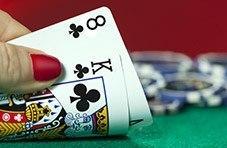The big advantage in blackjack for players is that the dealer has to hit with 16 points. The dealer busts quite often when hitting with 12-16 points. On the part of the players, card counting gives you another small edge in determining if the next card is more likely to be a small card or a ten-point card. Online casino blackjack at Springbok, your prime online casino for South Africa, is a great place to play and practice blackjack for fun and profit.
One way to increase your profits at blackjack is to recognize that 18 points in the player’s hand is actually not a strong hand.
When to Stand
Now, you will stand with 18 points on most hands. There are simply not enough cards that will help you and you’ll probably bust. But that does not mean that 18 points is a good hand. It is the most over-rated hand in blackjack! There are only three cards that can improve your hand.
However, if you’re playing at a full table you might have noticed that most of the high cards have already come out. You may notice that the very lowest cards, the aces, twos, and threes have not come out. In a situation like that, you might have very decent odds for hitting those elusive aces, twos, and threes. Still, these hands are few and far between so when you are dealt a hard 18 you will almost in every case simply stand and hope for the best.
The dealer has to hit on 16 points or less and in many games on soft 17. By the way, we encourage everyone to play games in which the dealer has to stand on all 17’s. Hitting on soft 17 is a good play for the dealer and for you as well. When you have 18 points, there are three hands that will beat you and one that will be a push and the dealer is forced to seek out those hands. In the long run, you can’t win by standing on 18 points even though you are almost always forced to do so with a hard 18.
You will stand with 18 points because it is still better than busting.
When to Hit
There are two hands where standing with 18 points is a poor decision. These are when you can split nines and when you have a soft 18.
Splitting Nines
This may seem so counter-intuitive to most players that they stand with a pair of nines rather than risk splitting them. When the dealer shows 2-7, you stand a good chance to win by standing with a pair of nines. Of course, the chances of winning are greater as the dealer’s card nears 7. If you can count cards, you might note that the dealer may very well be able to sneak in under 22 with smaller cards. In that scenario, you should split the nines.
Let’s assume that you are not counting cards. The dealer shows a 2-7 and you have a pair of nines. The best play is to stand. But if the dealer has 8 or 9 or an ace or any of the sixteen 10-point cards—as she will have in about 55% of all hands—you will need to think about splitting the nines.
If the dealer shows an 8, your chances of winning are slightly better if you split the nines over standing. If the dealer shows a nine, you have to split the nines because your 18 will lose often to a dealer’s 19. By splitting, you pit your nines against the dealer’s nines, a much fairer contest. If the dealer shows an ace or a 10-point card, you should stand with the pair of nines.
Soft 18
This is an ace and a 7. In this situation, there are several hands where you should actually double down. Against a 2-7 you should bet aggressively and double down. You won’t win every time, of course. But in the long run, blackjack is a very even game. You play for the fun of the challenge and if you play well, you will end your blackjack session either slightly ahead or slightly behind.
One way to play well is to play aggressively when the odds are in your favor such as a soft 18 against 2-7.
If the dealer is showing an ace a nine or a ten-point card, you have to hit the soft 18. In these hands, 18 points will lose far more often than the dealer will bust or finish with 17 points.
There is one other soft 18 hand that involves two aces and two small cards. If you’re playing a game in which you win with a five card hand, you have to hit this hand. Even if you aren’t playing such a game, you still have to hit this type of soft 18. The likeliest card you’ll get is a 10-point card but that simply brings you back to 18 points.
The Bottom Line
The most important point here is that 18 points is not a great hand in blackjack. You will either lose or push in a large number of hands. An 18 point hand is quite strong when the dealer shows 2-7 but it is equally weak when the dealer shows an ace, a 9, or a 10-point card.
You must never overstate the strength of 18 points. In the long run, you need to improve an 18 point hand as often as is reasonable to do so in order to bring your chances of finishing a blackjack session in the red. The tendency amongst blackjack players is to be complacent and passive when they have 18 points instead of being aggressive when that is the best way to proceed.




